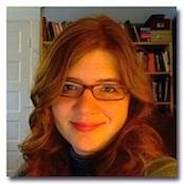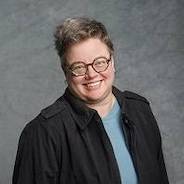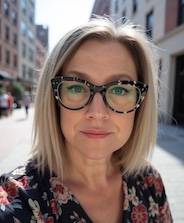Faculty Advisory Council
Rachel S. Anderson is a Professor of English whose research interests range from early medieval hagiography to contemporary science fiction. She teaches courses in Anglo-Saxon language and literature, Shakespeare, and recently developed an introductory science fiction course. In the minor, she teaches DS 201, Digital Identities and Communities, DS 350, Social Media in Culture, and DS 360, Ethics of Digital Culture. She has long been interested in the ways the medieval can be understood using both digital tools and contemporary biopolitical theory. She contributed to the manuscript coding work on the MLA edition of The Digital Ælfric and is currently completing a book on understanding medieval saints’ relics through the lens of biopolitics.
Email: [email protected] | Phone: (616) 331-8536 | Office: 212 Lake Huron Hall

Krista Benson is an Associate Professor in the School of Interdisciplinary Studies and one of the managing editors of Feral Feminisms, an independent, inter-media, peer reviewed, open access online journal. Their research and teaching interests center on the interconnections between colonialism, sexuality, gender identity, racism, and supporting marginalized youth and young people. In the minor, Krista teaches DS 340, Identity and Representation in Digital Culture and DS 495, Digital Studies Capstone.
Email: [email protected]| Phone: (616) 331-8230 | Office: 318 Lake Ontario Hall

Bradford Dykes is an Associate Professor of Statistics and teaches a variety of statistical methodologies courses in the Department of Statistics and the Data Science & Analytics graduate program that use the R programming language. Bradford’s research interests include enhancing learners’ statistical and data literacy, and has collaborated on projects in the Social Sciences, the Digital Humanities, and K-12 teacher development.
Email: [email protected] | Phone: (616) 331-4365 | Office: A-1-152 Mackinac Hall

Vinicius Lima is an Associate Professor of Graphic Design in the Department of Visual and Media Arts. He teaches courses on Typography, Logo Development, Print Layouts, User Experience, Branding Development/Identity, Service Design, and Portfolio Preparation. In the Digital Studies minor, Vinicius has taught DS 202 – Digital Data and Design. He is interested in designing effective experiences that consider design as a holistic practice, incorporating the various systems that inform the designer's work, including data, which he sees as the newest Design ingredient. Vinicius’ creative practice often moves between two-dimensional and three-dimensional spaces. His work ranges from exhibition design and branding systems to furniture and objects. He holds an MFA and MA in Design with a minor in Photography from The University of Iowa and a Bachelor of Architecture and Urban Design from the Federal University of Rio de Janeiro, Brazil. Prof. Lima received various recognitions by design organizations for his work.
Email: [email protected] | Phone: (616) 331-3119 | Office: 1119 Alexander Calder Fine Arts Center

Hazel McClure serves as Head of Liberal Arts Programs in the library and was the library liaison for Digital Studies from fall 2017 until winter 2019. She is interested in the ways that Digital Studies affect and are present in so many disciplines, much like information literacy. She's also interested in the way digital information has transformed information consumer behavior; peoples' access to information is often mediated by digital means, and creation of information is increasingly digital, which raises issues about the ways that people create, share, and interpret information.
Email: [email protected] | Phone: (616) 331-3077 | Office: 240 Mary Idema Pew Library Learning and Information Commons
[1542818948].jpg)
Christopher Toth is a Professor in the Department of Writing. He teaches courses in document design, business communication, professional writing, multimodal composing, and visual rhetoric. His research interests revolve around the intersections of visual rhetoric and professional communication, specifically the emerging use of infographics in business and professional documents. His scholarship has been published in Business and Professional Communication Quarterly, the Journal of Business Communication, and in other edited collections on information literacy. Christopher chaired the task force responsible for creating the digital studies minor.
Email: [email protected] | Phone: (616) 331-3367 | Office: 302 LOH

Dr. Adrienne Wallace is the Associate Director for the School of Communications and an Associate Professor of Advertising and Public Relations. She is an enthusiastic communicator with over 25 years of professional experience in both the public and private sectors, spanning nonprofit, health, education, government, hospitality, politics, lobbying, and finance. Her research, presentations, and writing focus mostly on the intersection of public relations with digital media, PR pedagogy, and public affairs.
Adrienne teaches undergraduate courses mostly in the PR emphasis and has a passion for student-to-professional development. She holds a PhD in public administration with a focus on public affairs and public policy from Western Michigan University (WMU). Her scholarly output includes co-authoring award-winning books, articles, and chapters, earning national recognition, such as the 2024 NCA PRIDE Outstanding Book of the Year for Strategic Social Media as Activism and the 2022 NCA SPARK Innovation in Teaching Award for co-creation of the Diversity and Inclusion Wheel, a practical model for PR practitioners to better focus on inclusion in creative campaigns. In 2025, Dr. Wallace was named Michigan Association of State Universities Distinguished Professor of the Year.
Email: [email protected] | Phone: (616) 331-8060 | Office: Lake Superior Hall

Ira Woodring is an Assistant Professor in the College of Computing, where he teaches courses on Programming, Programming Languages, and Game and Simulation Design. His research centers on enhancing the accessibility of computing resources for individuals with disabilities. Passionate about the power of technology, he believes that computing knowledge is an invaluable tool for all students, regardless of their major or career aspirations.
E-mail: [email protected] | Phone: (616) 331-5033 | Office: C-2-108 Mackinac Hall


